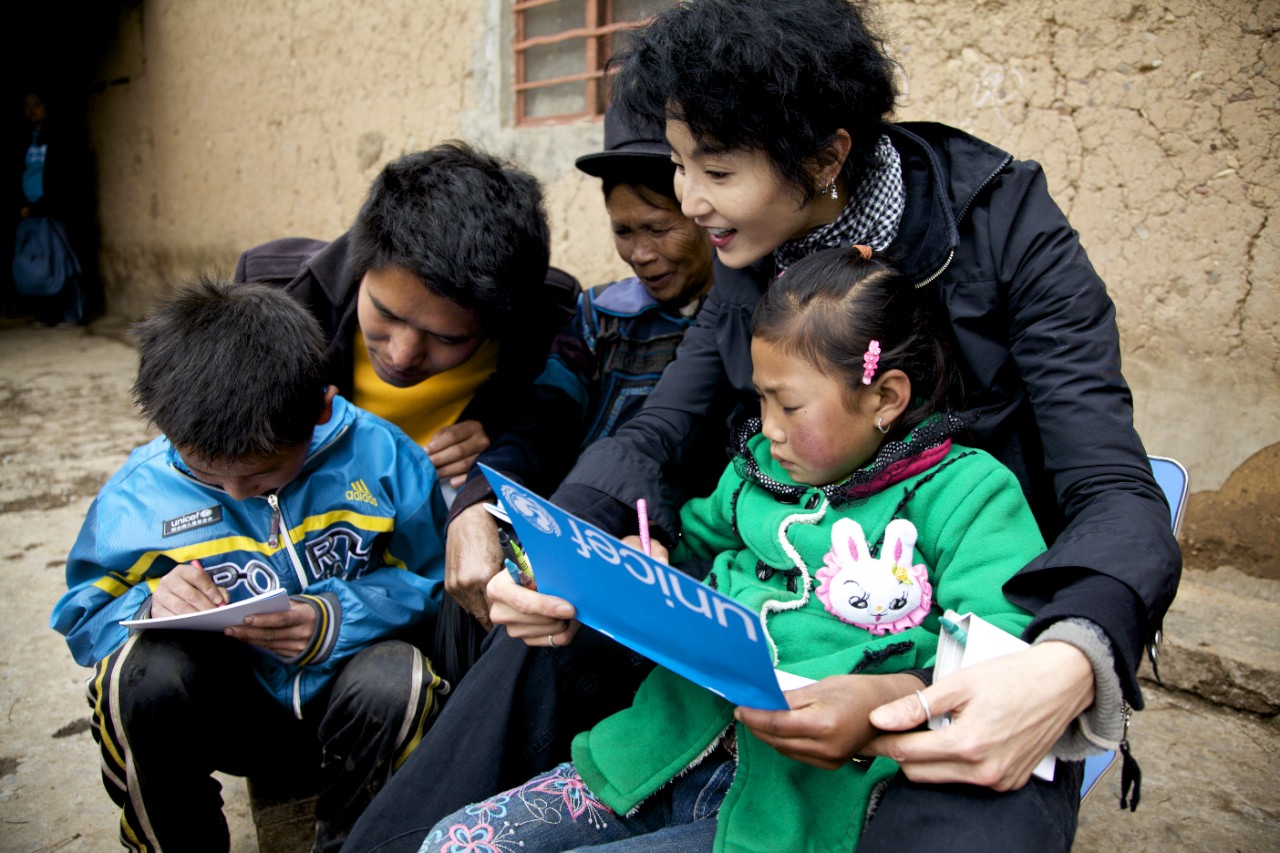|
Child protection is one of the key aims of UNICEF China, according to Ms. Mellsop. "The Chinese government is doing its utmost to provide a welfare system to ensure that the most vulnerable children have the same opportunities as those more fortunate to develop their full potential. We work closely with the government in piloting a child welfare system and in devising different approaches to developing it," Ms. Mellsop said.
The child welfare system to which she refers is being piloted through the "Child Welfare Demonstration Project," jointly launched in May 2010 by the Ministry of Civil Affairs (MCA) and UNICEF China. The project aims to pioneer a child welfare system model in 120 villages in Sichuan, Henan, Yunnan and Shanxi provinces and Xinjiang Uygur Autonomous Region.
|
 |
|
UNICEF Ambassador Maggie Cheung during her May 2011 visit to Jinyang County with orphans cared for by their grandmother. Since the launch of the China Child Welfare Demonstration Project the village's Child Welfare Director (second left) has helped children make successful applications for orphans' living subsidies. Photo courtesy of UNICEF |
Under the project, child welfare directors have been recruited and child welfare centers established in local communities to help monitor the situations of particularly vulnerable children, including orphans and children who live without parental care and in HIV-affected families. The new approach explores ways of working with village child welfare directors to collect data on vulnerable children that will enable the government to provide assistance based on their special needs. In 2010 China's central authorities allocated RMB 2.5 billion to provide vulnerable children with special subsidies and living allowances. The Child Welfare Demonstration Project aims to develop a community-based system to administrate subsidies and ensure that orphans and other vulnerable children get care and support from their immediate family, relatives and the community.
"We first piloted the model for children affected by HIV, and it has now been extended to all vulnerable children," Ms. Mellsop told China Today. "If a child cannot be cared for by his or her parents for various reasons, he or she should receive community-based family support rather than institutional care. International research shows that this is best for children's development, and also more cost-effective than institutional care."
Since 2001, UNICEF China has also been cooperating with the Ministry of Civil Affairs and China Disabled Persons' Federation to promote community-based family care and to prevent abandonment of disabled children. UNICEF is also working with its partners to promote the development of policies for strengthening social security and child welfare services for children with disabilities. This includes work to expand coverage of the current Policy for Strengthening Social Protection for Orphans to include children with disabilities. These policies aim to ensure that financial support and community-based services are provided to children with disabilities and their families.
Ms. Mellsop spoke of a pilot project that UNICEF and its government partners started about 10 years ago whereby families in Yibin of Sichuan Province foster disabled children. "When I visited that village I was impressed to see that these children were much loved members of their foster families. A loving family environment provides the best care possible for children, and is the model many countries are now using, especially as research shows that orphanages are not the best environment," Ms. Mellsop said. She went on to say that the government is carrying out trials of the family-based foster care model for disabled children in other parts of China.
UNICEF and the MCA are now piloting programs in Gansu, Heilongjiang and Sichuan provinces to establish community-based day care centers for children with disabilities. These centers will provide rehabilitation services, psychological support, learning opportunities and care advice to such children and their biological or foster families.
Tackling the Toughest Challenges
"One of the most serious and challenging child rights issues China faces is the impact of migration on children," Ms. Mellsop told China Today. She pointed out that one in every four children in China is affected by migration, with 55 million children left at home by parents pursuing work opportunities out of town and 27 million children accompanying their migrant-worker parents to new communities.
According to Ms. Mellsop, UNICEF has been helping authorities in certain urban areas to develop the capacity to register migrant children in their cities and to plan and administrate essential social services. The UNICEF-supported pilot projects to register migrant children are being carried out in partnership with local governments in Wuxi of Jiangsu Province, Shijiazhuang of Hebei Province and Beijing.
Registering basic information on migrant children can help local governments provide better education and health care resources. For example, many migrant parents overlook vaccinations for their children due to being constantly on the move and lack of awareness.
| 